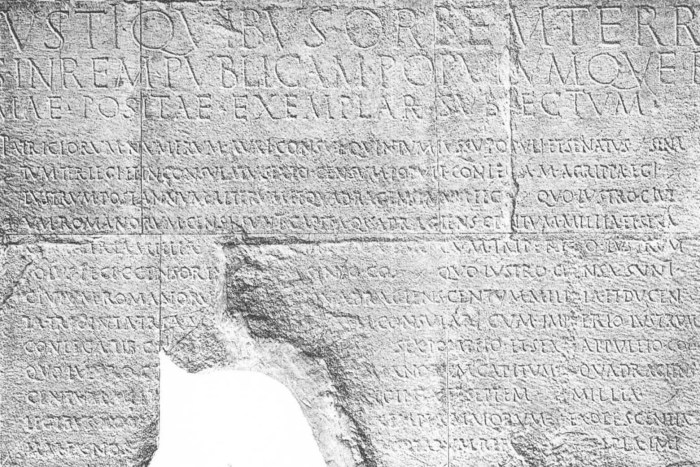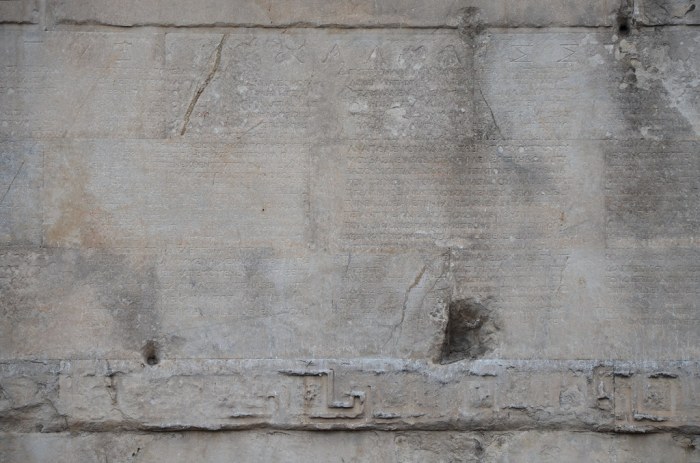The deeds of the divine augustus summary – Embarking on a journey through the “Deeds of the Divine Augustus,” we uncover a historical document that chronicles the extraordinary accomplishments of the first Roman emperor. With meticulous precision and compelling prose, Augustus himself narrates his reign, providing invaluable insights into the political, military, and cultural landscape of the Roman Empire.
This remarkable document, serving as both a testament to Augustus’s achievements and a propaganda tool to legitimize his rule, offers a captivating glimpse into the strategies employed by the emperor to shape his image and secure his authority.
Overview of the Deeds of the Divine Augustus

The Deeds of the Divine Augustus (Res Gestae Divi Augusti) is a monumental inscription that summarizes the life and accomplishments of the Roman emperor Augustus. It was commissioned by Augustus himself and inscribed on bronze tablets displayed in front of his mausoleum in Rome.
The Deeds provides a detailed account of Augustus’ military victories, political reforms, and cultural advancements, serving as an important source of information for understanding his reign and the early Roman Empire.
Augustus’ Accomplishments: The Deeds Of The Divine Augustus Summary
Augustus’ accomplishments, as recorded in the Deeds, are vast and wide-ranging. He expanded the Roman Empire through military conquests, bringing territories such as Egypt, Gaul, and Hispania under Roman control. He reformed the Roman political system, establishing a new imperial government that replaced the old Roman Republic.
Augustus also implemented numerous cultural advancements, including the construction of public buildings, the promotion of the arts, and the establishment of religious festivals.
Propaganda and Legitimacy

The Deeds of the Divine Augustus is not simply a historical record but also a propaganda tool. Augustus used the inscription to promote his image as a wise and benevolent ruler and to legitimize his rule. The Deeds emphasize Augustus’ military victories and political reforms, highlighting his role in bringing peace and prosperity to the Roman Empire.
It also portrays Augustus as a pious and devout emperor, who restored traditional Roman values and promoted the worship of the Roman gods.
Historical and Cultural Significance

The Deeds of the Divine Augustus is a primary source of immense historical value. It provides a detailed account of Augustus’ reign and the early Roman Empire. The inscription has been studied extensively by historians, providing insights into the political, social, and cultural life of the period.
The Deeds have also had a significant impact on subsequent historical writing, influencing the way later historians viewed Augustus and his rule.
Comparison with Other Imperial Documents
The Deeds of the Divine Augustus can be compared to other imperial documents from ancient Rome, such as the Res Gestae of Augustus or the Panegyricus of Pliny the Younger. These documents share similarities in their purpose of glorifying the emperor and promoting his image.
However, the Deeds is unique in its scope and detail, providing a more comprehensive account of Augustus’ reign. The Res Gestae is a more concise document, focusing on Augustus’ military victories and political reforms, while the Panegyricus is a speech delivered by Pliny the Younger that praises Trajan, another Roman emperor.
Artistic and Literary Representation
The Deeds of the Divine Augustus has been depicted in art and literature throughout history. Paintings, sculptures, and literary works have been inspired by the inscription, portraying Augustus as a wise and benevolent ruler. One notable example is the Ara Pacis, an altar dedicated to Augustus that depicts scenes from the Deeds.
The inscription has also been referenced in literature, with authors such as Virgil and Horace incorporating elements of the Deeds into their works.
FAQ Overview
What is the purpose of the “Deeds of the Divine Augustus”?
The “Deeds of the Divine Augustus” was created to glorify the emperor’s accomplishments and legitimize his rule.
How does Augustus use propaganda in the “Deeds”?
Augustus employs various strategies, such as emphasizing his military victories, downplaying his political opponents, and presenting himself as a benevolent ruler, to create a positive and authoritative image.
What is the historical significance of the “Deeds”?
The “Deeds” serves as a primary source for understanding the reign of Augustus and Roman society, providing valuable insights into the political, military, and cultural aspects of the empire.